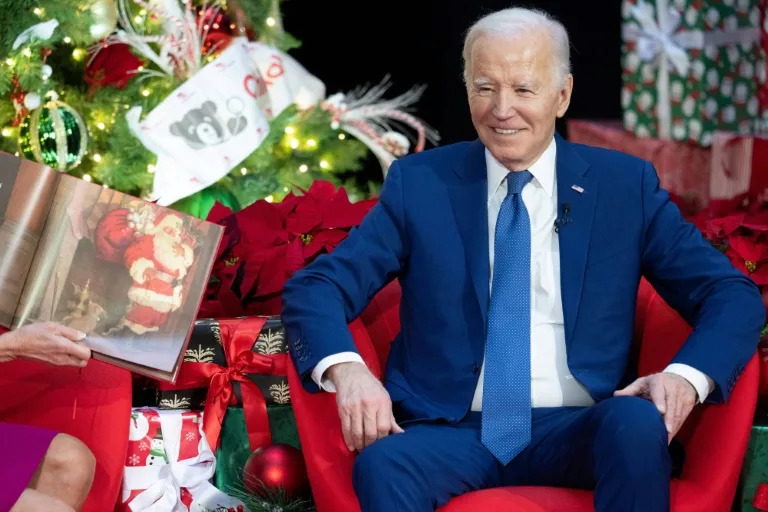US sees new isolation from Israel support

Nearly three years after President Joe Biden took office vowing "America is back," the country's international image is taking a beating as his administration backs Israel in its war with Hamas.
US President Joe Biden pays a holiday visit to patients and families at Children's National Hospital in Washington on December 22, 2023
In one step back from the newfound isolation, the United States on Friday, after painstaking negotiations, let through a UN Security Council resolution on humanitarian aid for the beleaguered Gaza Strip, after vetoing two earlier calls to halt the fighting.
But the United States still remained apart from some of its closest allies -- Britain, France and Japan -- which backed the resolution. The United States abstained, joined only by Russia.
A week earlier in the full General Assembly, the United States was joined by only two European partners, Austria and the Czech Republic, and none of its Asian allies in voting against a nonbinding ceasefire call in the war triggered by an October 7 attack on Israel by Hamas.
Most European policymakers, when it comes to the United States, still think first of Biden's robust support for Ukraine against Russia's invasion, said Leslie Vinjamuri, director of the US and Americas program at Chatham House in London.
"How it's playing right now in the rest of the world is that the United States cares about Israelis, cares about Ukrainians and really doesn't care about brown people. Unfortunately, that's the kind of narrative that's taken off," she said.
- Public anger swells -
Unlike his predecessor Donald Trump, who unreservedly backed Israel, Biden has openly voiced frustration over Prime Minister Benjamin Netanyahu and Israel's failure to protect Gaza civilians, even as the US continues to ensure military provisions and diplomatic protection.
Biden administration officials say their behind-the-scenes pressure has borne fruit, with Israel budging on letting in fuel, restoring internet access and opening crossings into Gaza.
But with images proliferating of Gaza's suffering, the storyline that Biden is "hugging Netanyahu close, and then pressing him hard quietly, worked for about a week," Vinjamuri said.
A survey of six Arab publics last month showed that just seven percent believed the United States played a positive role in the war, said Munqith Dagher, Middle East director of Gallup International.
Washington's reputation has severely deteriorated in the Arab world since the Iraq invasion two decades ago, but until recently 15 to 30 percent still viewed the United States favorably, said Dagher, who founded the Al Mustakilla research group in Iraq.
He said the US "trademark" represented "many good things, especially for intellectuals and middle classes, like democracy, human rights (and) freedom of speech," but "Gaza took out the last leaf, as they say."
Social media has brought unfiltered scenes from Gaza to Arab publics, showing Washington's "total bias towards the Israelis and denial of the human rights of Palestinians," he said.
Dagher said polling showed the main beneficiaries in Arab opinion have been China, Russia and, most strikingly, Iran, which has historic tensions with the Arab world but, unique among regional governments, has championed Hamas.
- Still top power -
US Secretary of State Antony Blinken has urged the world to focus its outrage on Hamas, whose fighters infiltrated Israel on October 7, killing around 1,140 people and taking some 250 others hostage, according to an AFP tally based on Israeli figures.
Israel has responded with a relentless air and ground campaign that Hamas authorities say has killed more than 20,000 Palestinians, mostly women and children.
Blinken said the United States has "done more than any other country" to bring assistance into Gaza.
Governments "want to work with us and are looking for American leadership in this crisis -- even countries that may disagree with us on certain issues," Blinken told reporters Wednesday.
China has stepped up regional diplomacy but the Biden administration has sought to call its bluff, urging Beijing to use its influence with Tehran to halt attacks on commercial vessels by Iranian-backed Huthi rebels in Yemen.
While China has little security apparatus in the Middle East, the United States responded to Huthi attacks by sending an aircraft carrier and setting up a coalition of countries to protect vital shipping lanes.
Brian Katulis, vice president of policy at the Washington-based Middle East Institute, said the Biden administration, while clearly aware of public anger, was prioritizing a "pragmatic" solution that addresses the threat of Hamas rather than a "symbolic" call for a ceasefire.
Many Arab nations that denounce US foreign policy are "the ones secured in part by the security umbrella the United States provides," Katulis said.
"I detect more than a bit of schizophrenia in a lot of statements coming out of the Arab world. They can't live with us; they can't live without us."
UN Security Council passes compromise resolution on Israel-Hamas war as US abstains.
The United Nations Security Council on Friday approved a resolution that calls for humanitarian pauses between Israel and Hamas, increased aid to Gaza and the creation of conditions that will allow for a sustainable end to fighting, ending days of closed-door negotiations.
The resolution calls for “urgent and extended humanitarian pauses and corridors throughout the Gaza Strip for a sufficient number of days to enable full, rapid, safe, and unhindered humanitarian access.”
The United States and Russia abstained from the vote, deciding against using their vetoes as permanent members of the body that would have shot down the resolution.
US Ambassador Linda Thomas-Greenfield praised the resolution but abstained from voting in favor of it after the text failed to include a condemnation of Hamas.
“We would love to see condemnation of Hamas,” a senior US diplomat told CNN. “We don’t understand why the council can’t just explain exactly how we got to where we are. But at the end of the day, that’s what diplomacy is all about.”
Throughout what the diplomat called “marathon negotiations,” the US was eager to not vote against the resolution after suffering global blowback for vetoing the last Security Council resolution that called for an immediate ceasefire.
Instead, in Friday’s resolution the language called for “urgent steps” to lay the groundwork “for a sustainable cessation of hostilities.”
“At the end of the day, creating conditions for sustainable cessation of hostilities is something that everybody’s looking to do,” the diplomat said. “And I think the big dispute over the last few weeks has really been: ‘Is the time right, right now, for a cessation of hostilities? Or do the conditions need to be right?’ We were comfortable with this idea of the conditions needing to be right for that.”
Sources had previously told CNN that a major sticking point over the draft was a call for the UN to “establish a monitoring mechanism in the Gaza Strip with the necessary personnel and equipment, under the authority of the United Nations Secretary-General.”
The US had argued that the proposal of a UN-created monitoring mechanism for aid going into the Gaza strip would be cumbersome and slow down the delivery of critical assistance.
The senior US diplomat told CNN that the initial idea to set up a new monitoring system inside Gaza during the war was “completely unworkable.”
“The UN told us privately there was no way they could do this. And our assessment was that it was not going to replace any existing mechanisms for the flow of aid,” the diplomat said. “So it essentially be grafting on a brand new, entirely duplicative mechanism to the aid that’s already going in and would probably create chaos and kind of slow everything down.”
Diplomats had been working behind closed doors to finalize the resolution drafted by the United Arab Emirates. A US official familiar with the discussions said the draft had started with calling for an “urgent cessation” of hostilities. Neither the United States nor Israel currently supports a ceasefire, so the US countered with “a more passive formulation,” the official said, describing the language that ended up in the resolution.
“Israel is aware and can live with it,” the official added, while arguing it was not the language on the cessation of hostilities that caused the delays but rather the disagreements over the monitoring mechanism.
The representative from Russia put an amendment before the council just before the vote that would have changed the language back to the original “immediate cessation of hostilities” but it was vetoed by the US.
An Israeli official responded to the vote, telling CNN, “We are grateful for the US efforts to address the most problematic elements in the proposed resolution. They really worked hard, and we really appreciate their efforts.”
“In our view, the resolution is unnecessary and proves the inability for the UN to play a positive role in the conflict. After nearly three months, the UN has yet to condemn the massacre of October 7,” the official said.
Thomas-Greenfield announced late Thursday that the US would support the measure after previously voting four times to delay a vote on the resolution. In the end, she abstained from the vote rather than actively voting in favor of the measure.
“We do have some principal positions, including that we think the council should be able to just clearly state that Hamas is responsible for kicking off this conflict,” the diplomat said.
“This resolution does a couple of things that the past resolution did not do,” the US diplomat said. “One is that it deplores all acts of terrorism. And that obviously is speaking to what Hamas is responsible for, even though it’s not naming it.”
US National Security Council spokesman John Kirby said Thursday that President Joe Biden had been in touch with members of his national security team and officials representing the US and the UN on discussions surrounding the resolution.
Friday’s resolution comes as the Biden administration has grown more vocal in expressing concerns over just how brutal the war in Gaza has been.
The US has vetoed previous measures at the UN Security Council and voted against a call for a ceasefire in the larger UN General Assembly.
Last week, the wider United Nations General Assembly voted to demand an immediate ceasefire in war-torn Gaza, in a rebuke to the United States, which has repeatedly blocked ceasefire calls in the Security Council.
While the General Assembly vote is politically significant and seen as wielding moral weight, it is nonbinding, unlike a Security Council resolution.
“As with any diplomacy, there’s going to be a compromise,” the US diplomat said. “There’s language that we would have preferred to see strengthened. There’s language that we wouldn’t quite have phrased it the way that was.”
- Questions and Answers
- Opinion
- Story/Motivational/Inspiring
- Technology
- Art
- Causes
- Crafts
- Dance
- Drinks
- Film/Movie
- Fitness
- Food
- Games
- Gardening
- Health
- Home
- Literature
- Music
- Networking
- Other
- Party
- Religion
- Shopping
- Sports
- Theater
- Wellness
- News
- Culture
- War machines and policy



